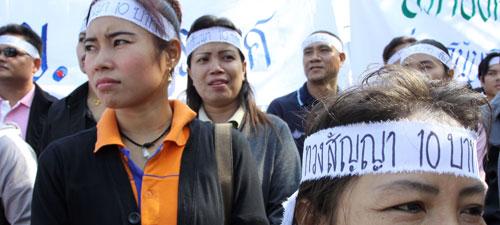Japan advises Kingdom to boost labour force

THE NATION | February 19, 2011
Japan advises Kingdom to boost labour force
By NALIN VIBOONCHART
Thailand should produce about 700,000 skilled labourers to serve the investment influx from Japanese small and medium-sized enterprises (SMEs) after the ongoing revision in the Japan-Thailand Economic Partnership Agreement (Jtepa).
Hiromasa Yonekura, chairman of Nippon Keidanren, the Japanese business association, said after meeting with the Joint Standing Committee on Commerce, Industry and Banking (JSCCIB) this week that Japan wanted Thailand to develop skilled labour to serve the increasing demand in the industrial sector.
Yonekura, who is also chairman of Sumitomo Chemical, said even his company had to recruit more people. So this is an important issue for industrial development in Thailand.
Dusit Nontanakorn, chairman of the Board of Trade of Thailand, said he had just come back from Japan and had been told by Japanese investors that Japanese SMEs were considering investing in Thailand. It is expected that those companies will require about 700,000 skilled labourers for their investment. So they have asked Thailand whether it is ready to provide enough workers to serve the demand.
Those Japanese companies will invest in the automotive, electronics and electrical-appliances industries.
"This is the important issue," Dusit said. "I’ve told Prime Minister Abhisit Vejjajiva that we have to start thinking and taking action in increasing skilled labourers.
"The demand for 700,000 comes from Japanese firms only. How about those from South Korea, Europe and the US ? Thus we have to survey the labour needs from those countries so that we can plan in advance to develop the human resources."
He said that if Thailand could not start taking action on this matter and could not provide human resources to serve the needs, Japan had other choices to go to, such as Vietnam.
"If we look into Asean countries, Indonesia is the biggest market in terms of population, whereas Vietnam has good economic growth. If we think about the financial centre, Singapore will be the answer. The country that is going to have a big project is Burma. So, where’s Thailand ? Our strengths in the past may be weaknesses now. We have to stop fighting each other and think more about how to develop the country," he said.
Pornsilp Patcharintanakul, deputy secretary-general of the Board of Trade, said the JSCCIB had asked Japan to revise the agreement in the Jtepa for some items. The requirements include exporting sugar to Japan, expanding the exporting quota for processed pork and accelerating the import tax reduction for processed chicken to zero.
The JSCCIB asked Keidanren to bring these issues to the Japanese government for consideration.
He said Japan formerly did not allow Thailand to export sugar. For processed pork, the country has a quota to export 1,000 tonnes per year to Japan. Thai producers would like Japan to increase the quota to 12,000 tonnes.
According to the Jtepa, the export tax imposed on processed chicken will be gradually reduced from 5.5 per cent to 3 per cent by the end of 2012, or half a percentage point per year. The tax will be zero in 2022, but Thai exporters would like to bring forward the result. It has asked Japan to impose zero export tax on processed chicken within three years, or 2015 if starting from 2012.
Pornsilp said that according to the Jtepa, both countries could revise the agreement after the fifth year of the agreement. The Jtepa started in 2007, so the agreement can be revised in 2012.
"We expect Keidanren to bring these issues to the consideration of the Japanese government. We don’t know whether Japan will revise the agreement as per our request," he said.





